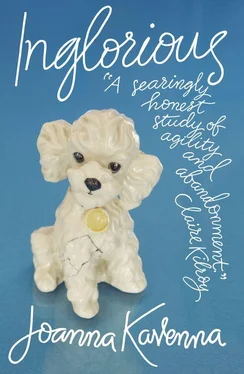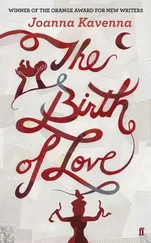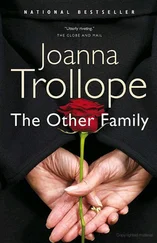‘What you mean is, he offers escapism,’ said Will.
There was a brief silence, while Rosa absorbed the crashing veracity of this remark.
‘Well, he sounds great,’ said Judy. ‘In the circumstances, I think whatever works for you is a good thing.’
‘Thanks,’ said Rosa. Now she was embarrassed she had brought up the subject anyway. She felt guilty and as if she had sold Andreas into slavery, or prostitution. Certainly she had been disloyal. ‘Anyway, that’s enough about that. How the hell are you?’ she asked again, determined to change the subject. She clinked her glass awkwardly at theirs, trying to toast them, but she clinked it too hard and there was a profound crack. One of the glasses broke. Wine gushed onto the tablecloth and there followed a flurry of apologies and reassurances. They all raised their voices to assert their benevolence. Rosa was really yelling her contrition, and Judy and Will were shouting back their lack of concern. ‘Old glasses, very cheap,’ said Judy loudly, and Rosa said, ‘God, I’m so sorry. I’m such a fool’, and Will was bellowing, ‘It had to happen soon enough. Got them from a garage.’ But of course they hadn’t. After that ruckus, after the wine had been mopped up and Judy had found another glass and filled it, Rosa said, again, ‘I’m so sorry. So, tell me how you really are.’
‘Oh us, us,’ said Judy, touching Will’s hand. ‘We’re just fine.’
‘Well, you certainly seem to be,’ said Rosa.
‘More lamb?’ said Will. Will with his thick hair and his look of health. A shank of meat at his elbow. As he handed some more lamb onto her plate, ladling vegetables after, Rosa was trying to formulate a thought, but discovered she was too drunk to finish it. There was no doubt that Will was hardworking. But he was blessed with fortune, all the same. His mother and father had bought this farmhouse for him, a fantasy playground, a breeding-ground. He had obliged them with a lovely brood; he was a worthy addition to the family line. She was happy for them, of course she was ecstatic, agog with delight, but something lurked beneath it. She was thinking of grandfather Tom, who had lived and died not far from here. At fourteen, his father told him to get a trade. He obeyed; the rest was compromise, happy enough, but hardly the dream. He always said he was fortunate to have been born in such a beautiful place — not Barrow itself, but the countryside around. He went walking in the hills at the weekend. He had never travelled the world; he had never gone far from home. He worked long days, brought home money for his family, played sport, walked a little and he had written comic poems. That wasn’t a bad effort, thought Rosa, as she accepted another spoonful of vegetables. She shrugged it off and tried to think lovingly about her hosts. Nothing more than this, she thought. From now on, nothing else, just kind thoughts.
She said, ‘I have this Platonic phrase in my head, is it Platonic? It runs something like if one person desires another, or loves them passionately, they would not desire them or love them passionately or as a friend unless they somehow belonged to their beloved either in their soul or in some characteristic, habit, or aspect of their soul. Where’s that from?’
‘What are you saying, Rosa?’ said Judy.
‘But this food is staggeringly lovely. Thanks very much.’
‘Perhaps it’s true, what you say,’ said Will.
Suddenly, there was a scream from upstairs, and Judy instantly leapt up and left the room.
‘That we are beholden to those we love, and accept their claims on us,’ said Will.
‘Santé, ’ said Rosa.
‘You should try a bit more,’ said Will. He was smiling again, in that ready way he had. It was easy for him to be convivial.
‘Should try a bit more to do what?’ said Rosa. The remark seemed to apply to a spectrum of things.
‘No, no, try a bit more of the lamb shank. Try it, it’s excellent,’ said Will, tipping it onto her plate. Rosa was like a plotter in a melodrama presented with the simple goodness of the heroine. She was there in her cape, whispering away, soliloquising madly, and Will was reaching towards her with his lily-white virtuous hands. Offering her lamb shank. She was too ashamed to say thank you. There was another pause, while Rosa racked her brain for anecdotes, witticisms, anything to entertain her host. Now they had dealt with Liam and Grace, set up their stalls, it was time to say something light and vague. Will, she was thinking, you are very good. And useful to your family. That is to be admired. Then why, she wondered, am I beginning to fear him? It was his eager line in understatement, she thought. His unceasing kindness. It affected her chemically, as if it was alkaline to her acid. I’m like a leech, she thought, that has been treated with salt. Or was it fire? She couldn’t remember how the Moses you treated a leech and realised her simile had been ill-judged. So she turned to her host and forced a smile.
‘So, Rosa, what’s the plan?’ said Will, slicing his lamb neatly and putting a piece in his mouth.
‘The plan, for what?’
‘Well, for the future,’ said Will, with a waving gesture, as if signalling the time to come.
‘Whose future?’
Will laughed. ‘Yours, Rosa, your very own future. Your recovery, if you like.’
‘Oh, Will, you know, it’s only a very tiny crise. Nothing major. Just a freak out. Better to have it now than in ten years, I say! We are all quashing the freak-out, do you not think? The freak-out lies coiled in the heart of being, like a worm. It’s not remotely important,’ said Rosa. ‘If you need a farm labourer, or a spinster governess for your children, you might think of me. My values are quite sound. I believe in truth and beauty, something like that, and I am sure there is such a thing as a good person.’
He laughed and patted her on the arm. I must look desperate, thought Rosa, as she held the fork to her mouth and tried to eat something. Now she thought she should never have come. The thick stone walls, the roaring fire, the farmhouse itself were too redolent of the places she had stayed as a child. The spectre of the past was lurking in the whitewashed rooms. The stacked-up books, the board games for a rainy afternoon, the fresh-faced lovely children; it was all making her think of when she was a child herself, forlorn in these draughty stone houses, fearful of going upstairs on her own, troubled by thoughts of immaterial things, conjurings. In one Lakeland house they stayed in, not the professor’s, a year when her mother wanted a change, there were big ancient portraits on the stairs, a man and a woman clad in Puritan garb, and Rosa hated them. She couldn’t pass them on her own and their eyes gave her nightmares. The shadows of the rooms disturbed her, and the creaking and rattling of old timbers. Her mother was always there, holding her hand. Now, what was she afraid of? As she and Will ate, and as she moved her mouth in pleasantries about the quality of the lamb, making light phrases, she realised. It was her mother! She was in the stone walls and the smell of the rain. She was treading softly in the garden. She was a distant reflection at the window, lurking behind the silence of the evening. Gently reproaching Rosa, for being so bound to the self, bound up in her selfishness. It had been a mistake to come, she thought. ‘Yes, yes, the lamb,’ she said, sounding desperate. ‘And what are your plans for Christmas?’ she asked. Will started to reply; he was always loquacious. She could rely on a full few minutes while he talked of in-laws and the logistics of driving children round the country. The Land Rover was apparently better. There was something about presents. Yet she faded him out, sat there nodding and thinking that she just had to tussle it all down again, push it back. She wanted to drop to the floor, grovel and wallow, beg them to send her mother back, but that was hardly appropriate. It was the stone and the smell of the rain, she thought again. Better still when she had confined herself to raging about Liam. Far better. More productive and possible to endure. Will was talking about Judy’s parents, and how tricky they were. Too generous, it seemed. Tendency to spoil the children. What do you do? What on earth do you do? Then there was a pause and when she looked up again she saw that Will was staring at her strangely. He had a hand in his orange hair; he looked like an attic frieze, expressing distraction. And she thought, there was the hand again, on her arm, but this time it wasn’t quite patting, more stroking. He was stroking her arm and saying ‘There, there, Rosa, really, it’s OK.’
Читать дальше












